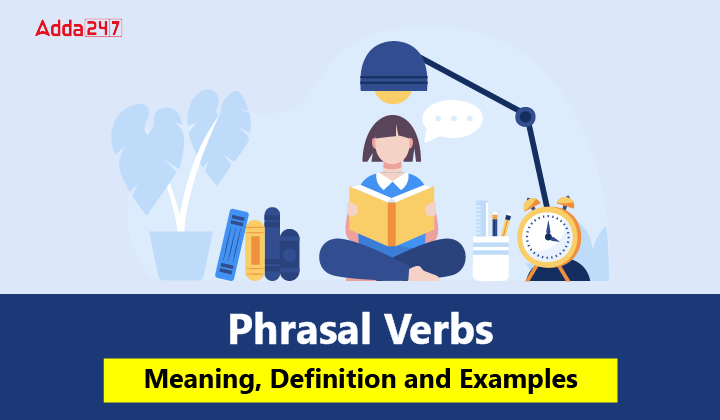
Phrasal Verbs are a very interesting and fascinating type of verb. It is essential to understand and learn the intricacies of the Phrasal Verbs to fluently use them in expressing thoughts and effective communication. Candidates preparing for the Government Teaching Exams must have a good command of the English language for better communication and efficiently answer questions on various topics such as Phrasal Verbs. Therefore, in the following article candidates will find detailed information on the Phrasal Verbs.
What is the meaning of Phrasal Verbs?
Phrasal verbs are a type of multi-word verb that consists of a main verb combined with one or more particles (prepositions or adverbs). They are commonly used in English and have specific meanings that may not be directly related to the individual words within the phrase.
The particle in a phrasal verb can change the meaning of the main verb, adding nuances or creating idiomatic expressions. These verbs are often used in informal or everyday speech, and their meanings can sometimes be idiomatic or non-literal. Phrasal verbs are an essential part of English communication and can greatly enhance your language skills.
Types of Phrasal Verbs
Phrasal verbs can be categorized into different types based on the nature of the particle (preposition or adverb) that accompanies the main verb. These are some common types of phrasal verbs, but it’s important to note that there may be overlap and variations within these categories. Phrasal verbs are a dynamic aspect of the English language, and understanding their types can help in using them correctly and interpreting their meanings. In the following section, candidates will find various types of phrasal verbs.
Intransitive Phrasal Verbs
These phrasal verbs do not require an object after the particle.
Example: She woke up early.
Transitive Phrasal Verbs (Separable)
These phrasal verbs can be separated, and the object can be placed between the main verb and the particle.
Example: He turned off the lights. OR He turned the lights off.
Transitive Phrasal Verbs (Inseparable)
These phrasal verbs cannot be separated, and the object must come after the particle.
Example: She looked after her younger siblings.
Phrasal Verbs with a Literal Meaning
These phrasal verbs have a meaning that can be understood from the individual words in the phrase.
Example: He picked up the book.
Phrasal Verbs with an Idiomatic Meaning
These phrasal verbs have a meaning that is not directly related to the individual words and can be idiomatic or non-literal.
Example: I ran out of patience.
Phrasal Verbs with a Prepositional Particle
These phrasal verbs use a preposition as the particle.
Example: They got on the bus.
Phrasal Verbs with an Adverbial Particle
These phrasal verbs use an adverb as a particle.
Example: She broke down crying.
What are the most used Phrasal Verbs?
Candidates must check out the following table, to find out some of the most used Phrasal Verbs. They will find the Phrasal Verbs along with their meaning and examples for better understanding.
| Most Use Phrasal Verbs | ||
| Phrasal Verbs | Meaning | Example |
| Ask out | to invite someone on a date | He asked her out to dinner. |
| Back up | to support or assist someone | My friends always back me up in difficult situations. |
| Bring up | to mention or raise a topic | She brought up an important point during the discussion. |
| Call off | to cancel something | They had to call off the concert due to bad weather. |
| Carry on | to continue doing something | Please carry on with your work while I’m away. |
| Come across | to encounter or find something by chance | I came across an interesting book at the library. |
| Cut off | to disconnect or stop the supply of something | The storm cut off the electricity in our neighborhood. |
| Figure out | to understand or solve something | I need more time to figure out this math problem. |
| Get along | to have a good relationship with someone | I get along well with my coworkers. |
| Give up | to stop doing or trying something | Don’t give up on your dreams; keep working hard. |
| Hang out | to spend time with someone casually | Let’s hang out at the park this weekend. |
| Look forward to | to anticipate or be excited about something in the future | I’m looking forward to the summer vacation. |
| Make up | to reconcile or forgive after a disagreement | They made up after their argument. |
| Put off | to postpone or delay something | Let’s put off the meeting until next week. |
| Take off | to remove clothing or to leave suddenly | He took off his jacket and sat down. |
| Turn on | to activate or start a machine or device | Can you please turn on the air conditioner? |
| Wake up | to stop sleeping and become conscious | I usually wake up at 7 a.m. every morning. |
| Work out | to exercise or solve a problem successfully | She works out at the gym every day. |
| Look up | to search for information in a reference source | You can look up unfamiliar words in the dictionary. |
| Set up | to arrange or establish something | We need to set up a meeting to discuss the project. |
How to use Phrasal Verbs?
Using phrasal verbs effectively involves understanding their meanings, knowing when and where to use them, and practising their usage in context. Here are some tips on how to use phrasal verbs:
- Learn the meanings: Start by learning the meanings of commonly used phrasal verbs. Understand how the combination of the main verb and particle changes the overall meaning.
- Understand separable/inseparable verbs: Differentiate between separable and inseparable phrasal verbs. In separable verbs, the object can be placed between the main verb and particle, while inseparable verbs require the object to come after the particle.
- Pay attention to prepositions and adverbs: Take note of the prepositions or adverbs that form the particles in phrasal verbs. The choice of the particle can significantly change the meaning of the verb.
- Use appropriate contexts: Consider the formality of the situation and choose phrasal verbs accordingly. In more formal or academic writing, it is often better to use single-word verbs or less informal alternatives.
- Use phrasal verbs naturally: As you become more comfortable with phrasal verbs, try incorporating them into your own speaking and writing. Practice using them in appropriate contexts to develop fluency.
- Expand your vocabulary: Continuously expand your phrasal verb vocabulary by learning new ones and incorporating them into your language skills.
Conclusion
Phrasal verbs constitute a fascinating and essential category of verbs in the English language. A thorough grasp of these verb forms is pivotal for effective communication and expressing thoughts fluently. For candidates preparing for Government Teaching Exams, mastery of English is crucial not only for communication but also for addressing questions on topics like phrasal verbs. The comprehensive understanding of phrasal verbs, their types, meanings, and usage, as discussed in this article, equips aspirants with the tools to navigate the nuances of these expressions. The ability to employ phrasal verbs adeptly enhances language skills and paves the way for success in the realm of teaching and beyond.








